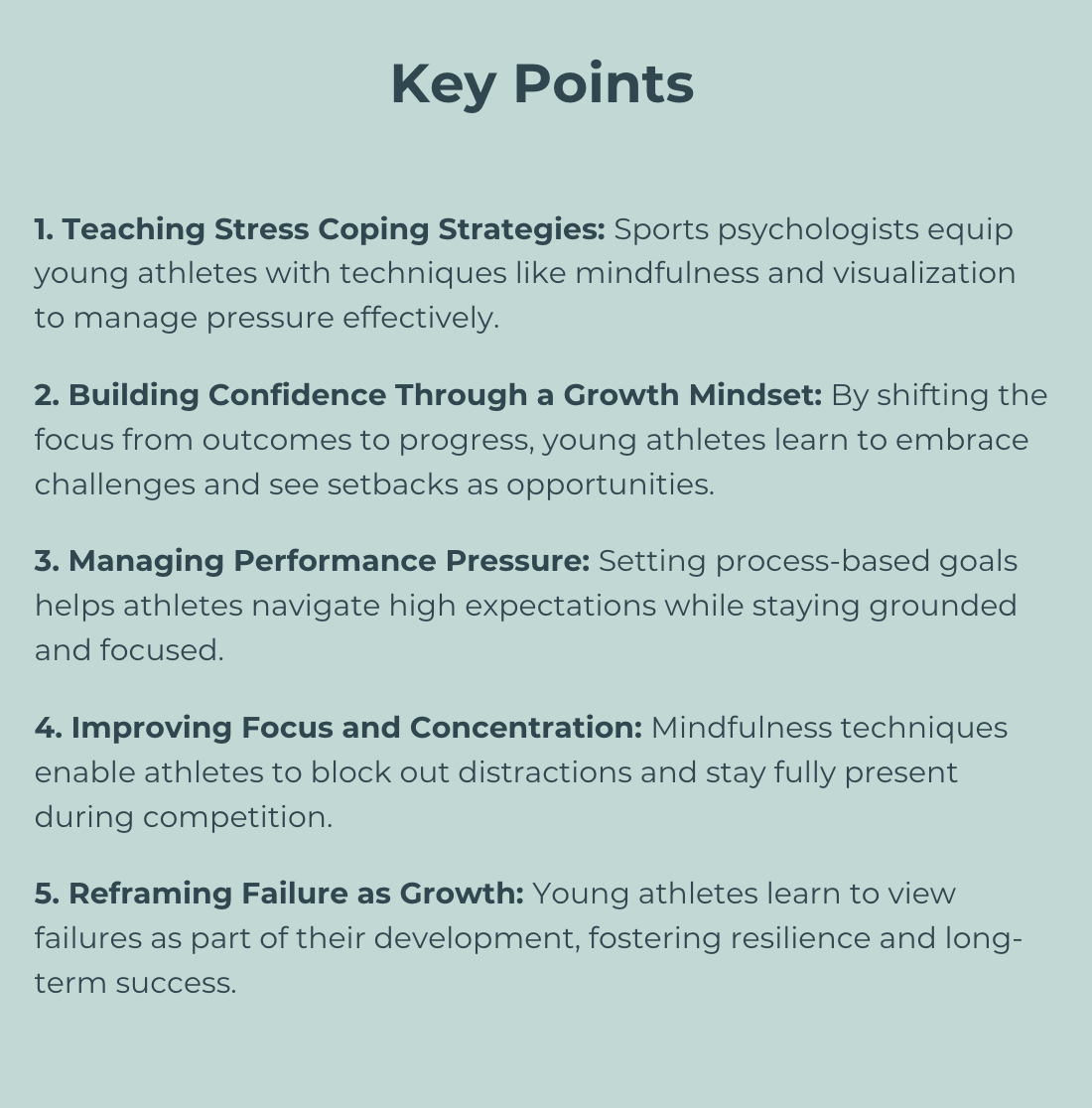Supporting Young Athletes: How Sports Psychologists Build Mental Resilience in Youth
What to Consider When Reading:
How can a focus on mental resilience complement physical training for young athletes?
What role do parents and coaches play in supporting an athlete’s psychological development?
The excitement of a big game, the nervous anticipation before a competition, the sting of a tough loss—these are all parts of a young athlete's journey. While the physical skills they develop are clear to see—dribbling a soccer ball with precision, making that perfect serve, or sprinting across the finish line—the unseen aspect of an athlete's growth is often the mental side. It’s here, in the quiet struggles of doubt, fear, and resilience, where young athletes face some of their greatest challenges. Sports psychology steps in to offer support, and, for many young athletes, it becomes the crucial element that makes all the difference between burnout and thriving. In this blog, we’ll explore how sports psychologists help young athletes build mental resilience, and why this is just as important as physical training for their overall success and well-being.
Why Mental Resilience Matters for Young Athletes
Imagine a 13-year-old tennis player. She practices every day after school, perfecting her serve and developing lightning-fast footwork. Her physical skills are undeniable, but during a big tournament, she becomes overwhelmed by anxiety and negative thoughts. She’s more focused on the fear of losing than the thrill of competing, and her performance suffers as a result. Sadly, her story is not unique. Many young athletes struggle with pressure, self-doubt, and perfectionism, which can impact their enjoyment of sports and their ability to reach their full potential.
Mental resilience is the ability to stay calm under pressure, adapt to setbacks, and maintain focus—qualities that are essential not only in sports but also in life. For young athletes, learning to overcome mental obstacles is as important as practicing drills or conditioning exercises. Mental resilience helps them to persevere through setbacks, enjoy the game regardless of the outcome, and thrive in a competitive environment without sacrificing their emotional well-being. This is where sports psychologists come in—they help young athletes build the tools they need to navigate these mental challenges.
The Role of Sports Psychologists in Youth Sports
Sports psychologists are professionals who specialize in the mental aspects of athletic performance. They work with athletes to improve their focus, develop coping strategies for stress, and cultivate a positive mindset. For young athletes, this support can be incredibly valuable, especially when the pressure to perform comes from coaches, parents, or even peers. Sports psychologists provide young athletes with a safe space to talk about their anxieties, fears, and frustrations—allowing them to build a foundation of mental strength that supports both their athletic and personal growth.
Let’s break down how sports psychologists help young athletes build mental resilience.
1. Teaching Coping Strategies for Stress and Anxiety
Stress is an unavoidable part of competitive sports, but young athletes often lack the skills to manage it effectively. Sports psychologists teach athletes coping strategies that allow them to channel stress in a positive direction. Techniques like deep breathing, visualization, and mindfulness exercises help athletes stay calm under pressure. For instance, a young swimmer might learn to use visualization to imagine the perfect dive before stepping onto the starting block, replacing nerves with confidence.
These techniques also translate to other areas of life, helping young athletes perform well in school, navigate social situations, and deal with personal challenges. By teaching young athletes how to manage stress effectively, sports psychologists empower them to feel more in control of their emotions and actions.
2. Building Confidence and a Growth Mindset
Confidence is a key ingredient in athletic success, but it doesn’t always come naturally—especially to young athletes who are constantly comparing themselves to others or feeling pressure to be perfect. Sports psychologists work to build an athlete’s confidence by focusing on what’s within their control, like effort and attitude, rather than outcomes. This helps shift the emphasis away from winning and losing and onto personal growth and progress.
One important concept that sports psychologists introduce is the idea of a "growth mindset." Coined by psychologist Carol Dweck, a growth mindset is the belief that abilities can be developed through hard work and dedication. Young athletes who adopt a growth mindset are more likely to view challenges as opportunities for improvement rather than threats to their self-worth. When a young soccer player misses a penalty kick, for instance, a growth mindset allows him to see it as a chance to learn and improve, rather than a defining failure.
By nurturing this mindset, sports psychologists help young athletes become more resilient in the face of setbacks. Instead of being discouraged by a poor performance, they learn to see it as a temporary setback and focus on what they can do better next time.
3. Managing Performance Pressure and Expectations
Performance pressure can be intense for young athletes, especially when parents and coaches have high expectations. The weight of these expectations can lead to anxiety, burnout, and even a loss of passion for the sport. Sports psychologists work with athletes to help them set realistic and meaningful goals that are centered on their own desires, rather than external pressures.
Goal-setting is a powerful tool for managing pressure. Instead of focusing solely on outcomes (like winning a championship), sports psychologists encourage young athletes to set process goals—such as improving their footwork, mastering a new technique, or simply having fun during practice. Process goals are entirely within the athlete's control, which makes them more empowering and less stressful.
Sports psychologists also teach young athletes how to reframe negative thoughts that arise from performance pressure. For example, instead of thinking, "I have to win this race or I’ll let everyone down," they learn to think, "I’m going to do my best, and that’s enough." This shift in mindset reduces pressure and allows athletes to enjoy the experience of competing without being weighed down by fear of failure.
4. Developing Focus and Concentration Techniques
Staying focused during a competition is crucial, yet it can be difficult for young athletes who are easily distracted by the crowd, the score, or their own internal dialogue. Sports psychologists use a variety of techniques to help athletes improve their focus and concentration. One effective method is mindfulness—teaching athletes to be fully present in the moment, rather than worrying about past mistakes or future outcomes.
For example, a young basketball player might be taught to focus on the feeling of the ball in their hands, the rhythm of their dribble, and the sound of their teammates, rather than getting lost in thoughts about whether they’ll make the shot. By practicing mindfulness, young athletes learn to block out distractions and stay in the zone, which ultimately enhances their performance.
5. Encouraging a Healthy Relationship with Failure
Failure is an inevitable part of sports. Not every race will be won, not every game will be a victory, and not every performance will be flawless. One of the most important lessons young athletes can learn is how to deal with failure in a healthy way. Sports psychologists help young athletes reframe their perspective on failure—not as something to fear or avoid, but as a natural and valuable part of the learning process.
By encouraging young athletes to see failures as opportunities to learn and grow, sports psychologists help them develop resilience and grit. A young gymnast who falls during a routine, for instance, can learn to analyze what went wrong, make adjustments, and try again, rather than internalizing the failure as a reflection of their worth or ability. This resilience not only makes them better athletes but also equips them with life skills that are essential for overcoming challenges beyond the sports field.
Final Thoughts
The benefits of sports psychology extend far beyond the field, court, or track. By helping young athletes develop mental resilience, sports psychologists are also equipping them with skills that are essential for navigating the challenges of everyday life.
Parents and coaches often emphasize the importance of physical training, but supporting the mental side of an athlete's development is equally important. With the help of sports psychologists, young athletes learn to enjoy the process of growth, embrace challenges, and find joy in the game—regardless of the outcome. These lessons are what make sports such a powerful tool for personal development, and they remind us that true success in athletics is about more than just trophies and medals; it’s about becoming resilient, confident, and capable individuals.
As we continue to support young athletes, let’s remember that mental resilience is not something they’re just born with—it’s something that can be nurtured and developed. Through the guidance of sports psychologists, we can help the next generation of athletes not only excel in their sports but also grow into strong, well-rounded individuals who are ready to take on whatever challenges come their way.
Take the First Step Toward your Well-Being
At The Mental Game, we know that navigating life’s challenges requires more than just determination—it requires the right support and strategies tailored to your unique needs. Our team of seasoned professionals is dedicated to helping you build the mental resilience and skills necessary to excel, no matter what life throws your way.
Visit The Mental Game to learn more about our services and schedule your FREE consultation today and take the first step toward a healthier, more resilient mind.

